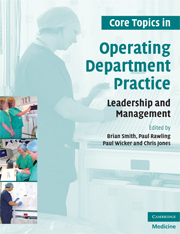Book contents
- Frontmatter
- Contents
- List of contributors
- Foreword
- Preface
- 1 Managing change in perioperative education
- 2 The role of the operating department manager within the context of the organization
- 3 Action learning: a new way of problem solving in perioperative settings
- 4 Agenda for change: what do theatre staff need to know?
- 5 The SWOT analysis: its place in strategic planning in a modern operating department
- 6 Corporate governance: setting the scene for perioperative practice
- 7 Managing different cultures: adversity and diversity in the perioperative environment
- 8 Leadership in perioperative settings: a practical guide
- 9 Management and leadership of advanced practice
- 10 Managing conflict in perioperative settings
- 11 The management and organization of emergency operating lists
- 12 Organizational culture
- 13 Development matters in the NHS; including a perioperative approach to the KSF
- 14 Equipment procurement: a purchaser's guide for theatre managers
- 15 The reflective practitioner in perioperative settings
- 16 New ways of working in perioperative practice
- 17 Damned if you do and damned if you don't: whistle blowing in perioperative practice
- 18 A manager's experience of recruitment and retention
- 19 The management of change
- Index
Foreword
- Frontmatter
- Contents
- List of contributors
- Foreword
- Preface
- 1 Managing change in perioperative education
- 2 The role of the operating department manager within the context of the organization
- 3 Action learning: a new way of problem solving in perioperative settings
- 4 Agenda for change: what do theatre staff need to know?
- 5 The SWOT analysis: its place in strategic planning in a modern operating department
- 6 Corporate governance: setting the scene for perioperative practice
- 7 Managing different cultures: adversity and diversity in the perioperative environment
- 8 Leadership in perioperative settings: a practical guide
- 9 Management and leadership of advanced practice
- 10 Managing conflict in perioperative settings
- 11 The management and organization of emergency operating lists
- 12 Organizational culture
- 13 Development matters in the NHS; including a perioperative approach to the KSF
- 14 Equipment procurement: a purchaser's guide for theatre managers
- 15 The reflective practitioner in perioperative settings
- 16 New ways of working in perioperative practice
- 17 Damned if you do and damned if you don't: whistle blowing in perioperative practice
- 18 A manager's experience of recruitment and retention
- 19 The management of change
- Index
Summary
So, what makes a good leader? Are leaders made or born? Is management a science or an art? The attributes of good leaders and managers are inextricably linked and have been defined as integrity, business understanding, consistency, ability to admit to mistakes, ability to listen and decisiveness. These are attributes that, I am sure, we would all aspire to emulate. I would also add ‘patience’ to this list, as good work does not happen overnight. A familiar comment by Eisenhower is a particular favourite of mine: ‘leadership is the art of getting someone else to do something you want done because he wants to do it’.
Good leadership and management are synonymous with change, something we are all familiar with in healthcare. During the last 10 years, healthcare has moved forward at breakneck speed. This has put healthcare professionals in expanding circles of influence. We are now aware of how our actions are governed, or managed, on both a micro- and a macro-level. This self-awareness of our professional personae has encouraged us to lead, although we might not be aware that we are leaders. Whether it is leading patients through difficult times, leading students on their path to professional fulfilment or leading our teams through challenging days, we as professionals must lead through an ever-changing landscape within healthcare.
So how do we prepare for these changes? Education and training is the core of our delivery of an excellent service to our patients. How we learn and what we learn has also changed.
- Type
- Chapter
- Information
- Core Topics in Operating Department PracticeLeadership and Management, pp. ix - xPublisher: Cambridge University PressPrint publication year: 2009

